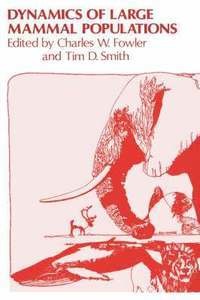
Liknande böcker
Dynamics of Large Mammal Populations
Bok av Charles W. Fowler
Tim D. Smith
First published in 1981, Dynamics of Large Mammal Populations was written by experts from four continents and six countries. It is a collection of papers on the population dynamics of large mammals and was the first synthesis of work in the field. The book helped provide identity and coherence to an emerging field. It has become a much-sought-after book.
The theoretical and empirical studies presented demonstrate the ways in which numbers of animals in large mammal populations change over time in response to a variety of factors. The studies cover a wide variety of species - including both terrestrial and marine mammals - and compare the population dynamics of various groups such as herbivores, carnivores, ungulates, cetaceans and pinnipeds. Included are species involved in controversial population management problems. Also covered are advances in managing the populations of large mammals, and advances in the theoretical basis of large mammal population dynamics. Numerous examples detail the interaction of mammals with their ecosystems.
Population biologists, wildlife biologists and managers, government researchers, environmentalists and marine mammal scientists can use the information made available here as a basis for comparative research and practical applications.
"The book contains an excellent mix of theoretical chapters, general overviews, and studies of specific animal speces, ranging from seals and whales to lions and elephants, taking deer, wolves, and grizzly bears along the way... But to the specialist it will be indispensable, forming as it does the only authoritative volume that deals with the population dynamics of this important group of animals." ORYX Fauna & Flora Preservation Society, July, 1983.
"One immediately realizes, by skimming the citations of the different chapters, that the researchers, working on such animals as whales, bears, seals, lions, and elephants had not been talking to one another, and that this book represents something of a first in this regard." Mathematical Biosciences, 1983.
"The book will be of particular interest and value to wildlife biologists faced with problems of managing wildlife resources and to people who use the resources." The Quarterly Review of Biology, 1982.
"This is an excellent book. One doesn't have to be a population biologist to understand the material. Best of all, the authors are refreshingly frank about areas of ignorance in population biology and the failure of even the best simulaion models to fit the real world... To sum up, there is food for thought in this volume for every zoologist with an interest in population biology and especially for those who study large mammals." BioScience 1982.
"In bringing a wealth of research effort to a wider readership, this book cannot fail to stimulate" Biometrics, 1982.







